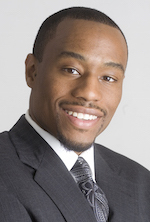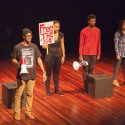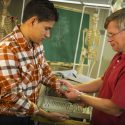Marc Lamont Hill to keynote Black History Month on campus
Although February is named Black History Month, it’s an opportunity for University of Wisconsin–Madison community members of all backgrounds to both celebrate and build cultural competency.
“We’re hoping that students are going to want to step outside of their comfort zone and everyone in the community — you don’t have to be African-American — will come,” says lead organizer Karla Foster, coordinator for African American Student Academic Services. “The celebration of Black History Month and Black history in general on this campus is very important, especially for our students of color.”

Marc Lamont Hill
More than 30 events, discussions, displays, performances and lectures are planned in celebration of Black History Month 2015 on the UW–Madison campus. A student planning committee selected the theme “A Celebration of Black Activism” for this year’s activities, drawn from reflection on the current social mood in America.
This year’s keynote event is the Distinguished Lecture Series presentation by professor, author and cultural critic Marc Lamont Hill. He will deliver “Building Community in an Hour of Chaos: Progress in the Age of Obama” on Thursday, Feb. 19, at 7 p.m. in the Symphony Room of Gordon Commons, 770 W. Dayton St. The event is free and open to the public.
By identifying key issues, challenges, controversies and trends that have emerged or lingered during the Obama era, Hill’s lecture spotlights the work that must be done to sustain the progress of the Freedom Struggle — and provides concrete solutions.
Since his youth in Philadelphia, Hill has worked as a social justice activist and organizer. An award-winning journalist and Distinguished Professor of African American Studies at Morehouse College, he is currently the host of HuffPost Live and BET News, as well as a political contributor for CNN. In 2011, Ebony magazine named him one of America’s 100 most influential Black leaders.
“We’re hoping that students are going to want to step outside of their comfort zone and everyone in the community — you don’t have to be African-American — will come.”
Karla Foster
Trained as an anthropologist of education, Hill’s research focuses on the intersections between culture, politics and education. He has written and edited several books, including the award-winning “Beats, Rhymes, and Classroom Life: Hip-Hop Pedagogy and the Politics of Identity.”
Hill’s lecture, and several other Black History Month events, reflect directly on events of the past several months. Hill himself has been on the ground in Ferguson, Missouri, standing with the mother of shooting victim Mike Brown during the grand jury’s decision.
During times of crisis and controversy, the broad scope of these activities offer both a chance to discuss current events and — just as important — opportunities to have fun while enjoying each other’s company.
“The adventure of sharing both our similarities and differences is where we build trust, respect and mutual appreciation for each other as individuals; it’s the fun part,” says Patrick Sims, interim vice provost for diversity and climate and chief diversity officer. “These positive exchanges and what we learn about each other can make the harder, issue-driven conversations easier to embrace.”
The month’s activities range from first-person experience forums like “Sitting at the Feet of Our Elders: The Black Student Experience” featuring UW–Madison alumni scholar Cornelius Gilbert and lectures by native Madisonian Richard Harris on growing up Black in Madison, to workshops led by student leaders on how to engage in current discussions while remaining personally healthy and academically productive.
Sims notes that Black History Month is also a reminder to support the many other organizations that celebrate cultural traditions different from one’s own.
“Even as we prepare to join Marc Lamont Hill for lessons in historic and contemporary civil rights issues, American Indian Studies is holding their annual traditional storytelling event and the Center for Southeast Asian Studies is examining the history of professional Asian jazz,” says Sims. “It’s our responsibility as an institution to teach broadly and prepare all of our graduates for a global existence and success.”
Tags: diversity, events, student life



